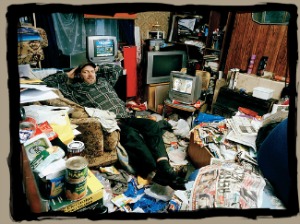
Tips for Helping the Hoarder in Your Life
According to PsychCentral, hoarding is a condition that affects about 30 percent of all people with obsessive-compulsive disorder (OCD). As a symptom of OCD, however, hoarding can be an indicator for additional, and more serious, types of mental illness, including an increased risk of both anxiety disorders and personality disorders.
Hoarding is characterized by the obsessive collection of material items, at the expense of in-home safety and health. Anything from dolls to trinkets to even newspapers and bags might be collected by a hoarder, even as living space within the home disappears. Many people struggle with watching a friend or family member suffer from hoarding. If that's the case, here are some suggestions for you to help your loved one:
Help Find a Local Specialist
A trained psychologist or other mental health professional is a hoarder's best bet for overcoming his compulsive tendencies. According to the National Alliance on Mental Illness, 70 percent of individuals afflicted with hoarding respond positively to either talk therapy or motivational interviewing. It's also important to note that while many experts believe that hoarding is sometimes a symptom of OCD, there is a growing faction of mental health professionals who believes it is its own mental health condition. The complexity of this condition, including how little we know about it, makes it unlikely that at-home treatments can be effective on their own. Hoarders need to consult with a therapist and make a plan of action that may include regular therapy sessions, intensive treatments or even inpatient counseling.
Offer Yourself as an Accountability Partner
As the friend or family member of someone struggling with hoarding, the best thing you can do is offer support as an accountability partner. Once the mental health professional outlines a course of treatment, loved ones can be integral in helping a hoarder stick to the routine. This can encompass many different tasks, including helping him to and from appointments, ensuring medications are routinely taken and offering oneself as a person to turn to when the hoarder is struggling to make the right choices. According to PsychCentral.com, hoarders are encouraged to turn to others for help when they face difficult moments, and your presence can be a significant help.
Visit the Hoarder's Home Routinely to Help Manage the Situation
Most hoarding treatment plans include a daily method for managing—and gradually reducing—clutter in the home. As a friend, you can support this process by making routine visits to the home and offering to help handle the clutter. Find a company that provides dumpster deliveries to residential homes, and schedule a time to help with removing items. Not only does this reduce the workload and the physical strife of decluttering the home, but it provides emotional support during what is often an emotional process.
Educate Yourself and Practice Patience
Because hoarding is a mental health condition, it's difficult for the average person to provide the support and guidance necessary for a full recovery. Professional assistance is critical, but friends and family play an essential role in providing support and understanding during this difficult time, according to the International OCD Foundation. For that reason, one of the best things you can do is educate yourself on the specifics of the condition, including how hoarding begins, what treatments have proven effective, what behavioral steps hoarders can take and what obstacles they may face on the way.
Some people are inclined to try and coach their loved one through to a quick, final resolution, but the path to recovery isn't always straight. Your patience will give friends and family a positive influence throughout the long, difficult process of overcoming a hoarding situation.
Check out these great sections
*Note - In accordance with Title 17 U.S.C. Section 107, any copyrighted work distributed under fair use without profit or payment to those who have expressed a prior interest in receiving the included information for non-profit research and educational or criticism purposes only. We make no claims to All graphics, photographs and cartoons etc. And we charge no fee for services. We do this because we love to give to others and make people smile :D If you see a graphic, comic, photo, joke, poem, quote, etc., that you feel belongs to you and you wish to have it removed from this website, please go to contact link and write to editors and they will promptly remove such graphic, comic, photo, etc. from the website so long as you have your proof of copyright. Many of our photos and graphics are from free public domain database sites Thank you
To return to the top of the page about Tips for Helping the Hoarder in Your Life click here. Thank you for reading this article. Please feel free too share it with your family, friends and your social network.Photo by Jason Whittaker via Flickr
